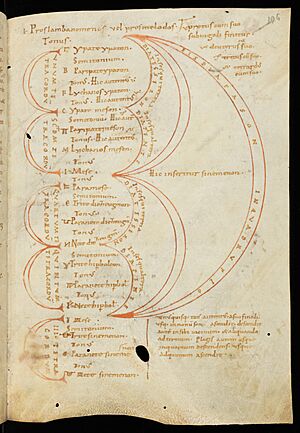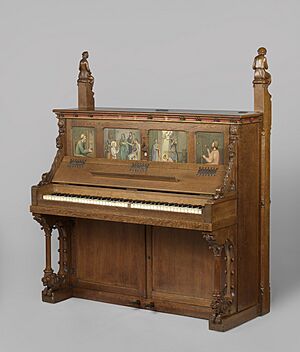Hucbald facts for kids
Hucbald (born around 840 or 850 – died June 20, 930) was a Benedictine monk. He was a very talented person. Hucbald was a music theorist, a poet, and a composer. He also worked as a teacher and wrote about the lives of saints (a hagiographer).
Hucbald spent most of his life at Saint-Amand Abbey. Because of this, people often called him Hucbald of St Amand. He was greatly inspired by the ancient writer Boethius. Hucbald's main work, called Musica, tried to connect old ancient Greek music ideas with the Gregorian chant music of his time. He was one of the most important music thinkers of the Carolingian era.
Contents
Hucbald's Life Story
Hucbald was born in northern France around 840 or 850. He studied at Elnone Abbey. This abbey was later renamed Saint-Amand Abbey. His uncle, Milo, was the head teacher there.
Hucbald learned very quickly. He excelled in subjects like arithmetic, geometry, astronomy, and music. These were part of the quadrivium, a group of four important subjects. He was especially good at practical music. An old story says that Hucbald wrote a hymn (a religious song) for St Andrew. It was so popular that his uncle became jealous. Because of this, Hucbald had to leave Saint-Amand. He found help from the bishop of Nevers.
He also studied with future masters like Remigius of Auxerre. By 872, Hucbald was back at Saint-Amand. He took over as the head of the monastery school. He was likely friends again with his uncle. Between 883 and 900, Hucbald traveled a lot. He helped to fix and rebuild music schools. Many schools had been damaged by the Normans. These included schools in St. Bertin and Rheims. In 900, he returned to Saint-Amand. He stayed there until he died on June 20, 930.
Hucbald's Important Works
Music Theory and Ideas
The only music theory book we know for sure was written by Hucbald is his Musica. He probably wrote it around 880. This book shows that he was very influenced by the writings of Boethius. Boethius was an ancient Roman philosopher.
Another important music book from that time was the Musica enchiriadis. For a long time, people thought Hucbald wrote it. But now we know it was written by someone else. This book is famous for showing a new way to write music notes. This system is called Daseian notation. It also has the first clear examples of Western polyphony. Polyphony is music with more than one independent melody played at the same time.
Musical Compositions
We can be fairly sure that Hucbald wrote a few sacred (religious) songs. Some of these songs are found in old music books. For example, they appear in the Winchester Troper. Other writings suggest he wrote many more songs. However, most of them are now lost.
Other Writings
Besides his music works, Hucbald also wrote poems. These poems were meant to be read, not sung. Two of his poems, written in classical Latin hexameters, still exist. Hexameters are a type of poetry line with six metrical feet.
One famous poem is called Ecloga de calvis. It has 146 lines. This poem praises baldness! Every single word in the poem starts with the letter "C". This is because "calvus" means "bald" in Latin. The poem lists many famous bald men. These include kings, generals, and even the apostle Paul. This poem was very popular during the Renaissance. People even thought reading it could help with stuttering.
His other hexameter poem is De diebus Aegyptiacis. This is a short poem about astrology. It lists the unlucky days in each month of the year. Hucbald also wrote several prose stories about the lives of saints.
See also
 In Spanish: Hucbaldo para niños
In Spanish: Hucbaldo para niños
 | Lonnie Johnson |
 | Granville Woods |
 | Lewis Howard Latimer |
 | James West |



